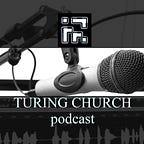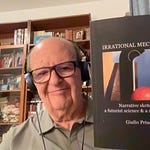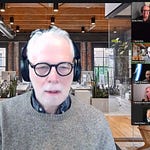This episode of the Turing Church podcast is a conversation with philosopher Eric Steinhart. The video is published on this website and on YouTube.
Eric Steinhart is one of my favorite philosophers. See my review of his last book “Believing in Dawkins: The New Spiritual Atheism” (2020). The spiritual atheism of Steinhart (I prefer to call it spiritual naturalism) is very close to my religion, and I highly recommend this book. The only things I don’t like about it are the title and the “militant” antagonism to traditional religion that is, I think, unnecessary and counterproductive.
See also my review of Steinhart’s previous book “Your Digital Afterlives: Computational Theories of Life after Death” in my book “Tales of the Turing Church” (Chapter 12).
These are the questions I had prepared:
Did Richard Dawkins say anything about your book?
Have you been criticized by Dawkins or others for interpreting Dawkins in a way that offers too much consolation to believers? For example, you note that Dawkins “frequently affirms that there is no life after death”, but you say that this is inconsistent with his own convictions. Dawkins, you say, “should have argued that false religious theories of life after death can be replaced with more plausible scientific theories of life after death.”
[Short summary of Eric’s answer: not by Dawkins, and not much by others. The idea of life after death should be “dereligionized.”]
For those who haven’t read “Believing in Dawkins” or your previous book “Your Digital Afterlives,” could you give a very short summary of your speculations on plausible scientific theories of life after death?
And what do you think Dawkins would say about your speculations?
You talk a lot of concepts like “cranes” that “lift matter to greater heights of complexity,” and “skewers” or “deep non-random factors in the laws of physics” that favor complexity. You say that the cranes and the skewers could be powered by (almost) known thermodynamics or by more exotic “purely informational principles at the roots of physics” that maximize value production (here you sound like Robert Pirsig). You coin the term “axiotropy” (value growth) for these things.
My question is, do we need radically new physics to make sense of axiotropy, or is today’s physics almost good enough? Schrödinger speculated (ref. “What Is Life?”) on “other laws of physics” that should complement known physics to understand life. Are axiotropy or Schrödinger’s “other laws of physics” just incremental improvements to known physics, or entirely new physics?
[Short summary of Eric’s answer: today’s physics is almost good enough and we could be close to better understanding axiotropy. Of course today’s physics is work in progress and our current understanding of nature is incomplete and imprecise, with many gaps. But there are solid indications that axiotropy could be related to the thermodynamics of maximum entropy production and the associated growth of pockets of complex order that, interestingly, are the fastest way for the universe to increase entropy. Other promising research directions are information physics, quantum information, and “it from qubit.”]
Could your spiritual naturalism be formulated in a way that is less antagonistic to established religions? In general, what are the prospects for spiritual naturalism?
[Short summary of Eric’s answer: he would like to see new forms of religiosity centered on spiritual naturalism, and there are indications that such forms of religiosity are emerging. He also says that militant atheism and religious fundamentalism share “a secret sympathy” with one another.]
What is this thing with Burning Man? Is Burning Man a next-generation service for spiritual naturalists?
Now listen to Eric’s answers and stay tuned for his next book, to be published soon.












